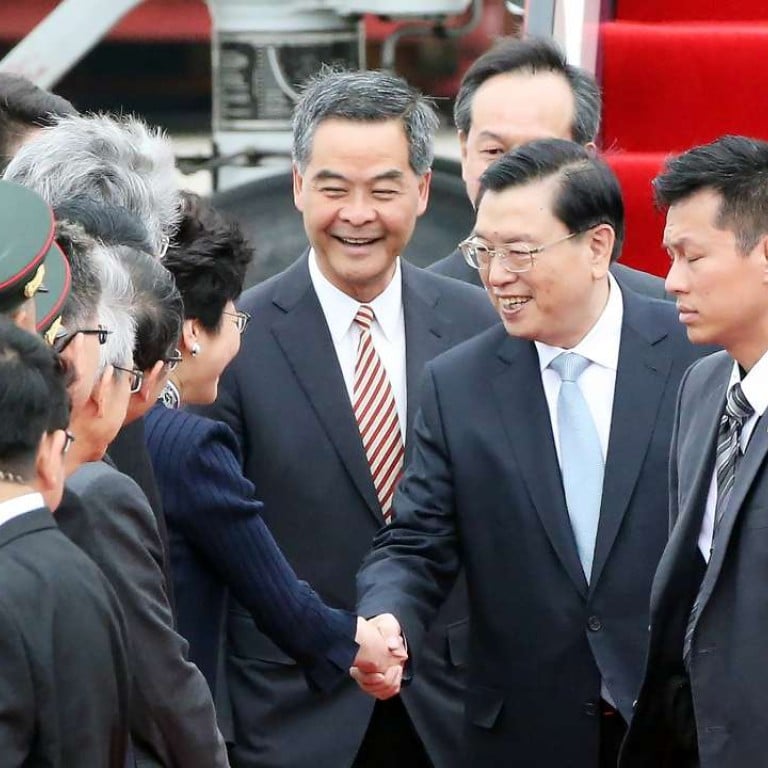
Smiles on one side, protests on the other as Zhang Dejiang arrives for Hong Kong visit
National People’s Congress chairman lands in Hong Kong offering praise for Chief Executive Leung Chun-ying and vowing to listen to locals
Hong Kong put on a rapturous official welcome for Zhang Dejiang on Tuesday while police kept guerilla-style protests at bay as the state leader began his three-day visit to the city by endorsing Chief Executive Leung Chun-ying’s leadership as “satisfactory”.
It was all smiles when Zhang stepped off his plane at midday, as a beaming Leung and his top cabinet members laid out the red carpet for the chairman of the National People’s Congress.
In his opening remarks at the airport, Beijing’s top official in charge of Hong Kong affairs said he was in the city to see, listen and learn.
That was followed by a closed-door meeting with Leung at government headquarters in Admiralty which, in an unexpected move, was shared with the public through the release of a video clip.
In a carefully calibrated speech, Zhang said President Xi Jinping had already given his “full endorsement” to Leung during his annual duty visit to the capital last December.
“The central government is satisfied with the work of the chief executive and of the SAR government,” Zhang said.
Political commentator Johnny Lau Yui-siu cautioned against reading too much into the terminology used by Zhang, while former Central Policy Unit head Lau Siu-kai said state leaders had been using the phrases “full endorsement” and “satisfied with the chief executive’s performance” interchangeably in recent years.
Zhang stopped short of giving any hint on next year’s chief executive election, but he expressed full confidence in Hong Kong and its “bright” prospects.
He made no mention of controversial issues such as Hong Kong independence and separatism.
Johnny Lau described the format of the meeting, where Zhang was briefed by Leung and senior officials about their work, as a reflection of Beijing highlighting its sovereign status over Hong Kong.
Under the old protocol, state leaders would only give a short speech before taking group photos with the city’s top officials, and meetings usually lasted for about 10 minutes.
Earlier on Tuesday, at the airport, Zhang said he would listen to “all sectors of society” on “what recommendations and requirements they have” regarding the implementation of the “one country, two systems” policy.
He used the three words – “seeing”, “listening” and “speaking” – to sum up his agenda.

While police deployed thousands of officers to protect Zhang, turned parts of Wan Chai into a fortress, and kept protesters well at bay to avoid embarrassing him, diehard activists used guerilla-style tactics to try to ambush him.
Officers were even posted on top of the iconic Lion Rock, but were foiled by protesters who unfurled a gigantic banner reading “I want genuine universal suffrage” on the adjacent Beacon Hill.
Scuffles broke out at multiple locations as a massive police presence tried to keep protesters out of sight and earshot.
At around 6pm, about 50 activists from the League of Social Democrats broke through a police cordon on Lower Albert Road as they attempted to march towards Government House.
Zhang will deliver a keynote speech at the Belt and Road Summit on Beijing’s trade strategy at the Convention and Exhibition Centre on Wednesday.
In the evening, he will meet 10 lawmakers, including four pan-democrats, at a cocktail reception before a banquet in his honour.
On Tuesday night a Hong Kong government source said: “Mr Zhang fully understands the situation in Hong Kong and is fully aware of the difficulties facing the SAR government.”


